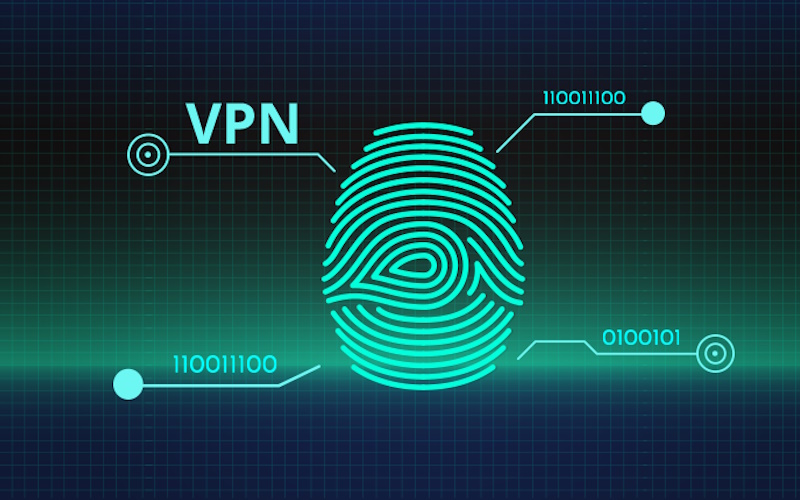
Understanding VPN fingerprinting is an essential aspect of online privacy and security in the ever-evolving world of cyber threats. It is crucial to comprehend how VPN fingerprinting works and how it can impact you (individual) and organization. VPN fingerprinting is a technique used by third parties to identify and track you. Even when you are using a VPN to protect your online activity. you can better protect your online privacy and security by learning about VPN fingerprinting.
In this article, I will explore the concept of VPN fingerprinting in detail, covering its importance, techniques used, choosing a reputable VPN provider, etc. By gaining an understanding of VPN fingerprinting, you can empower yourself. Take control of your online presence and protect your digital lives.
What Is VPN Fingerprinting
VPN safety is crucial in today’s digital age, where online privacy and security are becoming increasingly important. A VPN (Virtual Private Network) is a tool that encrypts internet traffic and hides your IP address. Allowing for anonymous browsing and access to restricted content. However, not all VPNs are created equal, and it’s essential to ensure that your VPN is safe. Secure to protect your online activities from prying eyes.
This knowledge can help you understand the risks associated with VPN use. Take appropriate measures to safeguard your sensitive information. Additionally, understanding VPN fingerprinting can help you make informed decisions about the VPN services you choose and your online activities.
Reasons Why VPN Safety is Important
Enhanced Security: VPNs create an encrypted tunnel for your internet traffic. Making it difficult for hackers, snoopers, and even your ISP to intercept your data. This is crucial when using public Wi-Fi networks, where your information is especially vulnerable.
Increased Privacy: By masking your IP address and location, VPNs help you browse the internet anonymously. This shields your online activity from being tracked by websites, advertisers, and even governments. Protecting your personal information and online freedom is paramount for your browsing safety.
Safeguarding Sensitive Data: Whether you’re working remotely, accessing online banking, or simply sending emails, a VPN encrypts your data. Adding an extra layer of security against data breaches and identity theft.
Bypassing Geo-Restrictions: Some websites and online services restrict access based on your location. VPNs allow you to connect to servers in different countries, effectively changing your virtual location. Granting access to content that might otherwise be unavailable.
Combating Bandwidth Throttling: Some ISPs throttle internet speeds for specific activities like streaming or downloading. VPNs can help circumvent this by masking your traffic. Make it harder for your ISP to identify and restrict your bandwidth.
Techniques for Making VPN Safer
Several techniques can be used to make a VPN safer, including choosing a reputable VPN provider. Using strong encryption protocols, and regularly updating the VPN software. Avoiding public Wi-Fi networks when using a VPN. Additionally, it’s important to be cautious when downloading files and clicking on links while connected to a VPN. These activities can still expose your device to malware and other security risks.
Use of Multi-Hop VPNs
Multi-hop VPNs are a type of VPN that routes internet traffic through multiple servers before reaching the final destination. This adds an extra layer of security, It makes it more difficult for third parties to track your online activities. Multi-hop VPNs are especially useful if you require a higher-level of privacy and security, such as journalists, activists, and whistleblowers.
Avoiding DNS Leaks
To prevent DNS leaks in VPN, it is essential to ensure that all internet connections are routed through the VPN-tunnel. This can be achieved by configuring the VPN client to use the VPN provider’s DNS servers. Rather than relying on the default DNS settings of the internet service provider. More so, regularly checking for DNS leaks using online tools can help identify and address any potential issues.
Choosing a Reputable VPN Provider
Selecting a reputable VPN provider is important in VPN fingerprinting to ensure strong security and privacy. Key factors to consider when choosing a VPN provider include the provider’s logging-policy, encryption standards, server locations, and customer support. Researching reputable VPN providers and reading reviews from experts/users can help identify a trustworthy provider that meets your specific needs.
Ensuring Strong Encryption
Strong encryption is essential to protect your data and online activities. You should choose a VPN provider that offers robust encryption protocols, such as AES-256. Secure tunneling protocols, such as OpenVPN or WireGuard. Regularly updating VPN software. Ensuring that the VPN connection is active before accessing the internet can help maintain strong encryption.
Regularly Updating VPN Software
This is important to ensure that the VPN client is secure and free from vulnerabilities. You should enable automatic updates. Check for updates regularly to ensure that your VPN software is up-to-date. Monitoring VPN connection logs and checking for any suspicious activity can help identify potential security issues.
Disabling WebRTC in Browsers
WebRTC is a technology that enables real-time communication in web browsers, but it can also expose your IP address. Even when using a VPN. To prevent this, you should disable WebRTC in your browsers. Use a browser that does not support WebRTC. Using a VPN provider that offers built-in protection against WebRTC leaks can help ensure your privacy.
Limiting Social Media Sharing
Social media platforms can collect a wealth of information about you, including your IP addresses, location, and online activities. To limit social media sharing in VPN fingerprinting, you should be cautious about the information you share on social media. Use privacy settings to limit the visibility of your posts. Avoid accessing social media accounts while connected to the VPN.
Practicing Safe Browsing Habits in VPN fingerprinting: This is important in VPN fingerprinting to minimize the risk of online threats and protect your privacy. This includes using secure websites (https). Avoid suspicious websites and email attachments, and use privacy-focused browsers and search engines.
